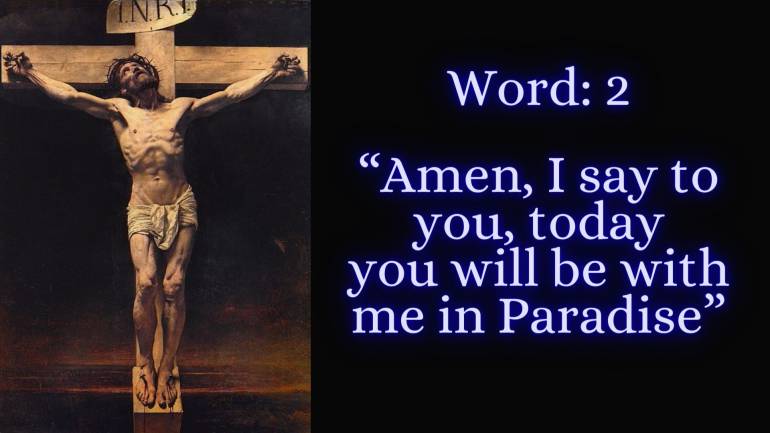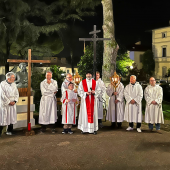The SEVEN LastWords of Jesus. Word: 2 - “Amen, I say to you, today you will be with me in Paradise”

A. Text: Luke 23: 39–43
“Now one of the criminals hanging there reviled Jesus, saying, “Are you not the Messiah? Save yourself and us.” The other, however, rebuking him, said in reply, “Have you no fear of God, for you are subject to the same condemnation? And indeed, we have been condemned justly, for the sentence we received corresponds to our crimes, but this man has done nothing criminal.” Then he said, “Jesus, remember me when you come into your kingdom.” He replied to him, “Amen, I say to you, today you will be with me in Paradise.”
B. Exegesis:
1. “reviled Jesus”
Jesus is crucified on the Skull. Above Him is an inscription that reads, “The King of the Jews is this.” This demonstration is meant to deny His Kingship.
Accordingly, three groups mock the Crucified Jesus in response to His forgiving words: the rulers of the people, the soldiers, and one of the two criminals crucified with Him, the bad thief: “He saved others, let him save himself if he is the chosen one, the Messiah of God”, “If you are King of the Jews, save yourself", “This is the King of the Jews”, “Are you not the Messiah? Save yourself and us.”
These three groups sneer at, jeer at and revile Jesus being the Christ, the Chosen One and the King. For them, salvation means escaping from the cross, “... save himself ... save yourself ... save yourself and us ...” For them, Jesus who keeps on hanging on the cross, can hardly be a king. For them, the king was a military commander like David who led armies into battle, won wars and saved Israel (2 Samuel 5). Thus they openly deny Jesus’ Kingship.
2. “The other, however, rebuking him, said in reply”
Jesus was crucified between two criminals. They were receiving just punishment for their crimes against the state. One mocks Jesus.
In the face of denial, Jesus remains fully silent. He does not do a thing. Nor does He say a thing. For Him, the cross is the way of salvation and the throne of His Kingship.
Instead, the ‘good thief’ answers. He does not join the other thieves in mocking Jesus. The episode of The Good Thief is recounted only in Luke. In a major departure from the Synoptic tradition, this other criminal in Luke:
i. acknowledges his sinfulness and the justice of his sentence: “And indeed, we have been condemned justly, for the sentence we received corresponds to our crimes ...”
ii. recognizes Jesus as innocent, “... but this man has done nothing criminal” and as the King, “... into your kingdom.” He dares to say from the cross that Jesus has done nothing criminal.
Perhaps this thief would have heard about Jesus – how He was a good man, helping those in various needs.
iii. addresses Jesus intimately in a friendly manner as “Jesus” – as once addressed by the blind beggar of Jericho, “Jesus, Son of David, pity me”, whose petition was granted.
iv. and seeks Jesus’ help to participate in His kingdom when He will come to establish it, having overcome the present situation of anguish: “Jesus, remember me when you come into your kingdom.”
3. “Jesus, remember me …”
This repentant sinner’s attitude towards Jesus is in contrast to the words and actions of others. He very cleverly reads the present moment as an opportunity for salvation and starts, right from the tree of death, the walk of repentance. The cross is, for him, the way of salvation. In the end, his desire is fulfilled.
The thief challenges Jesus’ mercy and goodness: ‘Jesus, I know you to be a good man. Can you be good to me also, a criminal, when you come into your kingdom?’ He receives an immediate answer to this.
4. “… when you come into your kingdom”
For Luke 23,42 there are two attested readings:
i. “When you come en (= in) your kingdom”
ii.“When you come eis (= into) your kingdom”
The second - “When you come into (eis) your kingdom” - is probably more original. It is more consonant with the Lucan theology, “Was it not necessary that the Messiah should suffer these things and enter into (eis) his glory?” (24,26). Furthermore, the preposition ‘eis’ is more appropriate with the verb e;lqh|j (elthes) from ercomai (erchomai).
Later scribes would have been troubled by the realization that the Kingdom of God was not brought about immediately by the death of Jesus and would have shifted the focus to the parousia – the eschatological coming of Jesus – which is involved in the first reading - “When you come in (en) your kingdom.” Hence this reading could be considered as a later scribal development.
5. “Amen, I say to you, today you will be with me in Paradise”
The dying Jesus responds with greater generosity than the petitioner requests, for Jesus will not simply remember the man after entering into His Kingdom; He will take the man with Him ‘every day.’ Today itself he is going to be with Jesus in the heavenly state of eternal bliss.
Throughout His life, Jesus has saved sinners. Now, at the last moment of His life, He, with endless benevolence, saves another converted sinner. The penitent sinner thus receives salvation through the Crucified Jesus.
Being in the company of Jesus in Paradise is the destiny of the penitent sinner. This is the destiny of all the disciples of Jesus. This is our destiny as well.
C. Application:
6. To possess this destiny, let us recognize Jesus as the true King of our life, personal and social, human and cosmic – just as people eventually accepted David as the King of North/Israel and South/Judah (2 Samuel 5) – accept our human fragility with a repentant heart and always ask His forgiveness. Salvation is not an escape from the cross, but the cross is the road to salvation.
“Amen, I say to you, today you will be with me in Paradise.” After listening to these words of Jesus, can we ever doubt the mercy and goodness of Jesus? He who had mercy on the worst of criminals, will He not have mercy on us – if we only cry out to Him?
In Luke, we always find a Jesus, who loves the unlovable and forgives the unforgivable. In Parables, the prodigal son is forgiven, on his return, expecting the worst; the repentant publican returns home justified; the Good Samaritan, having displayed the intrinsic goodness of the Gentiles who behave better than the two clerics, Levite and priest, becomes the true neighbour. In life, Jesus stepped into the house of Zacchaeus, who was socially stigmatized as a public sinner, for being a tax collector of an oppressive foreign empire; lauded the faith of the Samaritan leper, who alone returns to give thanks and receives the fullness of salvation. Finally from the cross, He does not refuse to welcome the repentant thief into His home, the Kingdom.
Even the worst of sinners, among us, need not ever fear to plead for mercy from Jesus. The world may judge and punish us but Jesus will always be merciful to us. This may happen to us even at the last moment of our lives.
This does not, however, mean that we should lead sinful lives hoping to be forgiven at the last moment of our life. But this does mean that even the worst of sinners has a chance with Jesus, always and even, at the hour of death. The one condition required of us is that we do not remain stubborn in our sins but have the humility to turn to Jesus.
7. His Grace Nicholas Marcus was an oasis of mercy. Mercy poured out like the morning dew from him. He neither sought publicity nor popularity from the mercies he showed to clergy and laity alike.
“His Grace was a living Saint. He administered the diocese with love and compassion” writes a layman “Lots of the priests in the diocese have told me that he was a man with a big heart. He treated the priests with love, respect and empathy. He did not hurt their feelings. Once a priest told me that when he was facing various problems in the diocese His Grace treated him as a father listening to his child’s grievances and sometimes His Grace was in tears. When they fell ill he took a personal interest to look after them. He visited and prayed for them day and night. My brother who was a priest told me several times that His Grace was a very kind and holy person. He treated the faithful the same way. He loved them and treated them as his children.”
His Grace suffered for his priests and laity. He at times burnt his fingers on their behalf. But he did not have any regrets. He was rather delighted to do so, like a father or mother in a family. How many of our priests and lay leaders are back in the mission field, rendering a better service unto this day after being embraced, forgiven, reinstated and encouraged constantly by His Grace? Everyone left his presence with a light heart and a ray of hope for tomorrow. Thus, every repentant sinner, whether of clergy or laity, received the balm of God’s mercy through His Grace Nicholas Marcus Fernando.
Radio Veritas Asia (RVA), a media platform of the Catholic Church, aims to share Christ. RVA started in 1969 as a continental Catholic radio station to serve Asian countries in their respective local language, thus earning the tag “the Voice of Asian Christianity.” Responding to the emerging context, RVA embraced media platforms to connect with the global Asian audience via its 21 language websites and various social media platforms.














